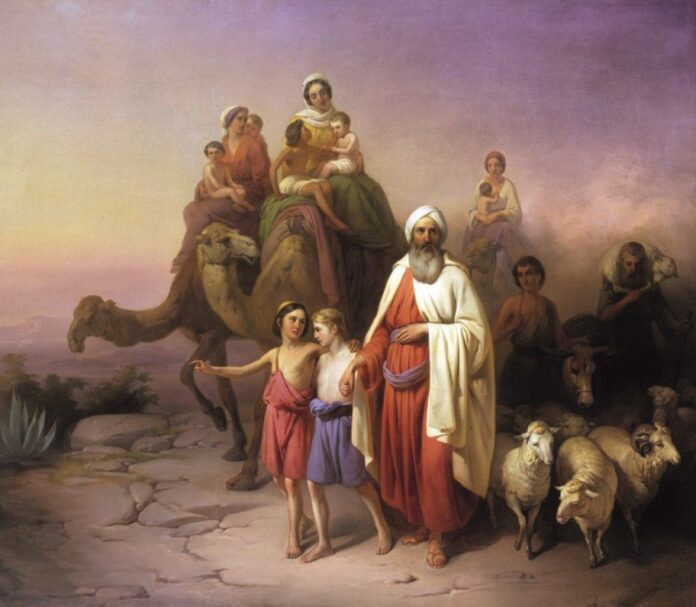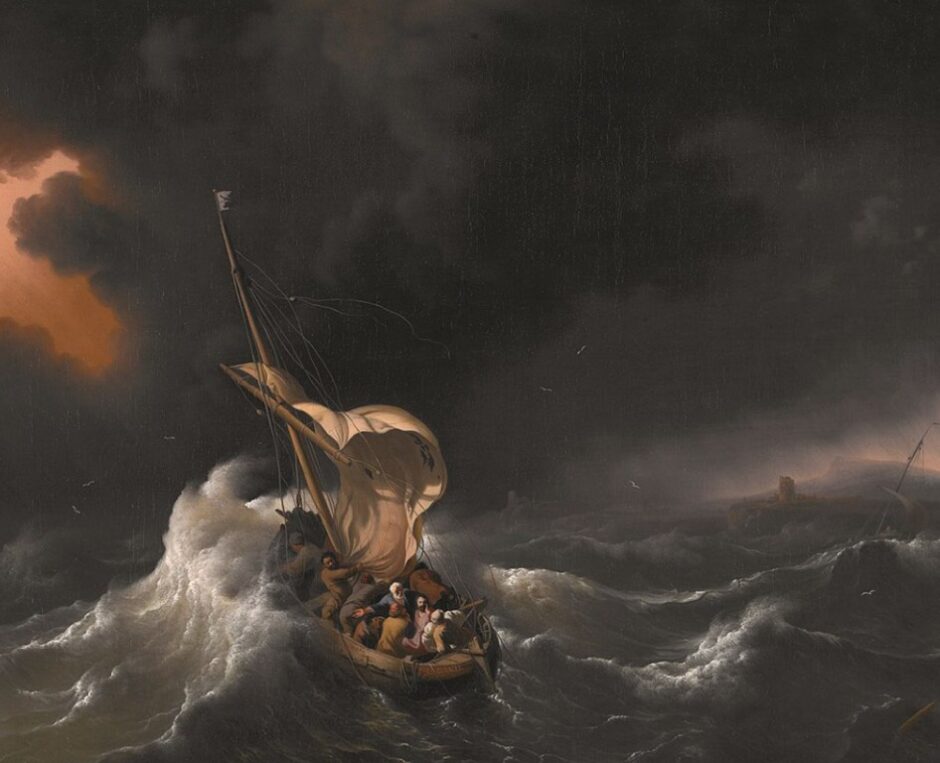When Abraham first left Ur of the Chaldees, God made him a promise. He said He would make Abraham’s descendants into a great nation. That promise meant a lot to Abraham, because up to then he and his wife had never been able to have any children, although they had been married for many years. If he was to be the father of a great nation, then he would argue Sarah must be going to have a baby after all.
As they journeyed towards the land of Canaan, they must often have talked over this promise. They knew that when God says He will do something, He always does it. He had warned Noah about the coming of the Flood, and that had happened, in spite of the sceptics. He had said He would bring Abraham to another country, and now they were nearly there. How soon, they must have asked themselves, would the baby be born? They were quietly excited, but patient, and as the months sped by, they kept thinking the great event would be just round the corner. However, nothing happened, and Abraham would wish he could be given a little reassurance from the Lord.
His opportunity came one evening, shortly after his great victory over the armies from the East in which he had rescued Lot. That night, God appeared to him in a vision. ‘Fear not, Abram,’ He said, ‘I am your shield; your reward shall be very great’ (Genesis 15:1). At once Abraham seized his opportunity: ‘O Lord God, what will you give me, for I continue childless?’ (v. 2).
God’s answer was unmistakable. He made Abraham stand outside his tent door and look up at the cobalt sky, blazing with myriads of stars. ‘Look toward heaven,’ He said, ‘and number the stars, if you are able to number them… So shall your offspring be’ (v. 5).
That night the ageing couple slept peacefully. Now they knew God meant what He said.
A Broken Promise?
However, the years continued to slip by, and Abraham and Sarah regretfully realised that they were middle aged. Still no baby came along. At last Sarah passed the time of life when childbearing is normally possible. Her heart ached, and she was inconsolable. One day she persuaded Abraham to take her Egyptian servant girl as a concubine, perhaps hoping that might jolt her own womb into activity (16:1–2). But the only result was to increase her bitterness when Hagar flaunted her obvious fertility before her jealous mistress. Her baby was Ishmael, and though Abraham loved his little son, Sarah made life hard for his mother.
Eventually, Abraham was 99 years old and Sarah 89. They had heard nothing from the Lord for many years. Suddenly, one day, the heavenly voice came again to Abraham. ‘I am God Almighty; walk before me, and be blameless, that I may make my covenant between me and you, and may multiply you greatly’ (17:1–2). Abraham could hardly believe his ears. But God was insistent. He even gave the child-to-be a name: ‘Sarah your wife shall bear you a son, and you shall call his name Isaac… I will establish my covenant with Isaac, whom Sarah shall bear to you at this time next year’ (vs. 19–21). Nothing could be more definite than that!
To have a baby at that age—it was ludicrous. It certainly took some believing. But the next part of the story is the most impressive of all. Abraham and his wife did believe, in spite of the difficulties. They believed, because God had said it would happen. This is what the Apostle Paul says about Abraham’s side of the triangle:
He did not weaken in faith when he considered his own body, which was as good as dead (since he was about a hundred years old), or when he considered the barrenness of Sarah’s womb. No unbelief made him waver concerning the promise of God, but he grew strong in his faith as he gave glory to God, fully convinced that God was able to do what he had promised (Romans 4:19–21).
Sarah, too, decided that if God said it was possible, it must be so. ‘By faith Sarah herself received power to conceive, even when she was past the age, since she considered him faithful who had promised’ (Hebrews 11:11). A wonderful thing now happened to them both. They were rejuvenated, so that their physical powers returned. In fact, Sarah became so attractive that the king of the region where they were staying took her into his harem, causing Abraham great distress until she was released, and this at the age of 90 (Genesis 20). Abraham himself also continued to father children for many years after the birth of Isaac—a man whose body had been as good as dead! It was a miracle, and faith in God’s promise made it possible.
At last, on time, to the joy of Abraham and Sarah, a perfect baby was born—a boy, just as God had said. The happiness that filled the camp on that wonderful day was commemorated in the name God had chosen, for Isaac means “laughter”. Many a smile he brought to his adoring mother; her longing fulfilled in that tiny bundle of joy.
A Lesson in Faith
There is a great lesson to be brought out from this episode in the chronicle of Abraham. It teaches us a lot more about the great Bible quality of faith, without which, the writer of the Hebrews insists, it is impossible to please God (Hebrews 11:6).
We noticed in an earlier article a practical faith at work when Noah constructed the ark. Believing the Flood would come, he took steps to be ready. He spent all he had, and laboured with his own hands on the project, in order to save his family. We also saw Abraham leave Ur without a backward glance at the command of God, travelling a huge distance to the land God had promised him. It took great courage, in both cases, to run the risk of failure. If God proved wrong, there could be no putting the clock back and starting over again.
But in some ways this kind of faith, the sort that demands we get up and go, is easier than the kind we have just been considering in the life of Abraham and Sarah. Just to go on waiting, passively, for God to do what He said, when the evidence suggested He had forgotten all about His promise, was a great test of the human spirit. In such circumstances, confidence crumbles, and black doubt gnaws at the heart. It is to Abraham’s eternal credit that he never lost his trust in God. This passive, waiting-for-God faith is often picked out in the Bible as a quality to be commended.
The Wilderness Journey
Take the people of Israel, for example. Two months into the journey from Egypt to the Promised Land, they came to a dry barren wilderness. The supplies of food they had brought with them were exhausted, and they could find nothing to eat. They began to curse Moses for having brought them out of Egypt to starve in the desert. But God was cross because they grumbled (Exodus 16:8).
Was not that a bit unreasonable, you might ask, in view of the circumstances? Well, look at the full story. God had promised that He would bring them to Canaan, upon His honour (Exodus 3:17). He had already worked great miracles in delivering them from the Egyptians. He therefore considered they should have had enough faith in Him to believe He would see them over this temporary difficulty, even though humanly speaking there was no obvious solution. He gave them food from heaven. ‘He humbled you and let you hunger and fed you with manna, which you did not know, nor did your fathers know,’ Moses wrote, ‘that he might make you know that man does not live by bread alone, but man lives by every word that comes from the mouth of the Lord’ (Deuteronomy 8:3). As in the case of Abraham, to believe in those circumstances meant to wait, and trust in God.

The Storm on the Lake
Take another example from the ministry of Jesus—twelve disciples, out in a fishing boat in the middle of the night. A great storm blew up. Tough and experienced sailors, they soon realised the peril they were in. The Lake of Galilee is subject to violent storms that lash the surface into deep, choppy waves that sink good ships in broad daylight, and this was inky night. The foaming water surged over the bulwarks. They baled faster and faster. Still the water gained on them. The motion was sickening. Exhausted, they began to panic.
They grabbed Jesus, asleep in the stern, and shook him awake. ‘Master, Master, we are perishing!’ they shrieked into his ear
(Luke 8:24). Unperturbed, Jesus stood up and spoke to the raging waves. Within minutes the wind fell, the waves died down, and there was a great calm. Then Jesus rebuked the disciples. ‘Where is your faith?’ he said (v. 25).
Again, you might query whether this was not a bit hard on them, faced with such danger. But the fact is, they had heard the testimony that Jesus was the Messiah (Luke 4:41). They knew, from his life of love, his words of compelling, refreshing truth, and his power to heal, that he was none other than the Son of God. Therefore, they could have reasoned, Jesus was not going to be allowed to drown in a little storm on a lake, with his work still undone. In his company, they were really quite safe.
Faith is demanding. It insists on believing all will be well, in spite of appearances, when God’s word is at stake. This is the faith that lifts disciples out of the ordinary run of humankind, and enables them to face suffering, persecution, or disaster with courage and hope. It is just such a faith which keeps us believing that Jesus will come again to reign on the earth as a king, because God said he will (Luke 1:32).
Like Abraham’s baby, the Kingdom has been a long time coming, and we cannot make it happen ourselves. But one day, the waiting will be over. The prophet Jeremiah sums it up: ‘The Lord is good to those who wait for him, to the soul who seeks him. It is good that one should wait quietly for the salvation of the Lord’ (Lamentations 3:25–26).
David Pearce
(to be continued)




